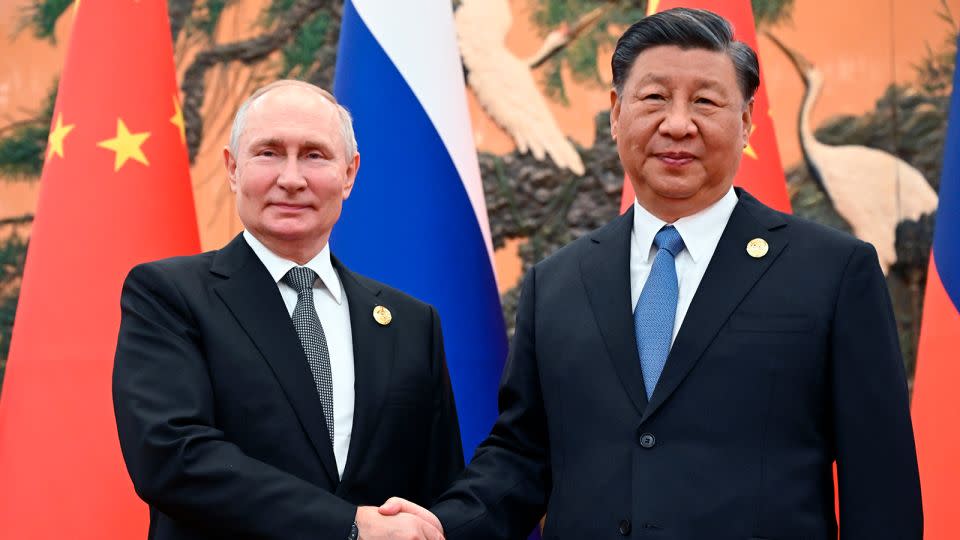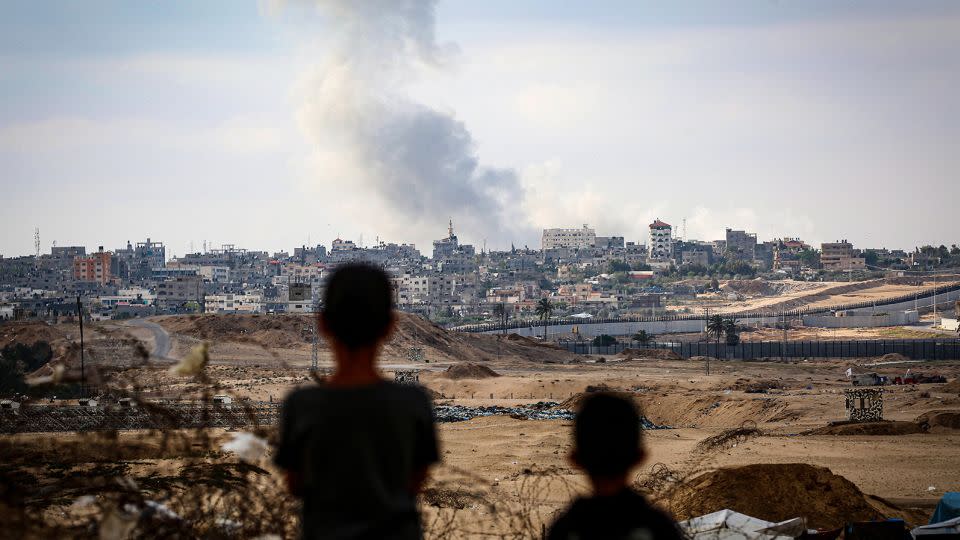Putin to meet Xi in Beijing as world convulses from global conflicts
- Oops!Something went wrong.Please try again later.
- Oops!Something went wrong.Please try again later.
Chinese leader Xi Jinping will welcome Vladimir Putin to China on Thursday for the Russian president’s second visit in less than a year – the latest sign of their growing alignment amid hardening global fault lines as conflict devastates Gaza and Russia makes advances in Ukraine.
Putin will arrive in China just over a week since entering a new term in office, extending his autocratic rule until 2030 – the result of an election without any true opposition.
His visit, set to take place May 16-17, according to Chinese state media, mirrors Xi’s own state visit to Moscow just over a year ago, where he marked the norm-shattering start of a new term as president – like Putin, after rewriting rules around how long leaders can serve.
Their meeting comes months ahead of the American presidential elections and as Washington faces mounting international backlash over its support for Israel’s war on Gaza. It’s set to provide a platform for the leaders to discuss how all this can advance their shared ambition to degrade and offer an alternative to American power.
The visit also comes as the two leaders operate within what observers say is a loose but growing coordination of interests between avowedly anti-American countries Iran and North Korea. Pyongyang – which has an economy almost entirely dependent of China – is believed by Western governments to be aiding Russia with war supplies. So too, the US says, is Tehran, which is being bolstered economically by Russia and China and is a powerful player in the conflict in the Middle East.
Putin will arrive for the two-day state visit emboldened by the survival of his wartime economy and amid a major new offensive along key points of the front line in Ukraine. For Xi, freshly returned from a European tour, the visit is an opportunity to showcase that his allegiance to Putin has not broken his ability to engage with the West.
In an interview with Chinese state news agency Xinhua published Wednesday ahead of his travel, Putin hailed the “great prospects” of the countries’ partnership and their joint efforts to “strengthen the sovereignty, protect the territorial integrity and security of our countries.”
The leaders aimed to deepen cooperation in “industry and high-tech, outer space and peaceful uses of nuclear energy, artificial intelligence, renewable energy and other innovative sectors,” Putin added.
But the optics of the strident allegiance belie a more challenging picture.
Pressure is mounting on Beijing from Washington over its alleged support for Russia’s defense industry. In Europe, Xi had to navigate sharp tensions in France – only welcomed with fanfare in Serbia and Hungary, while China’s key partner, Russia, remains isolated on the world stage.
Xi has ramped up his calls for Europe and other countries to help the world avoid a “Cold War,” suggesting they resist what Beijing sees as US efforts to contain China.
But the leader himself – including as he hosts Putin this week – is seen to be tightening relationships to underscore a growing global split that could deepen divisions with the West, whose technology and investment, experts say, China needs.
“We live in a more dangerous world, authoritarian powers are increasingly aligned. Russia is receiving support for its war of aggression from China, Iran and North Korea,” NATO chief Jens Stoltenberg warned last month.
“This reminds us that security is not regional, security is global. And we must work with our like-minded partners around the world to preserve and protect transatlantic security.”

‘Grand strategy’
Looming over Xi’s meeting with Putin this week are Western threats of more sweeping actions against his country if it continues sending certain goods to Russia. The US government says dual-use exports are enabling Russia to build up its defense industry.
“The pressures are arguably bigger than they were in the past two years,” said Li Mingjiang, an associate professor of international relations at Singapore’s Nanyang Technological University, pointing to a new raft of sanctions from the US earlier this month targeting Chinese firms – and the potential for more, including from the EU.
China has said it closely monitors exports of dual-use goods and denies its trade with Russia is anything outside of normal bilateral exchange. Bilateral trade between the two countries reached a record $240 billion last year.
Even close observers of Xi’s opaque decision-making are divided on whether all this means the Chinese leader will seek to use his time with Putin this week to advocate for a settlement in the conflict soon.
But China’s official trade data from March and April both show declines in exports to Russia compared with the same periods the previous year – indicating Beijing may be taking steps to protect against Western sanctions hitting deeper into its commercial and financial sectors.
Any recalibration there, however, is unlikely to stem deepening of cooperation across a range of areas between the two countries, who hold regular military drills and diplomatic exchanges. It’s also unlikely to change Beijing’s bottom line when it comes to Russia’s war, analysts say.
“Russia is fundamental to China’s grand strategy,” said Manoj Kewalramani, who heads Indo-Pacific studies at the Takshashila Institution research center in Bangalore. While Beijing doesn’t want escalation, “there is a deep interest in making sure that Russia doesn’t lose the war,” he said.

‘Force multipliers’
The war in Gaza — also expected to be a touchpoint in Xi and Putin’s discussions — has opened opportunity for the two countries’ shared goals, analysts say.
Those goals, broadly speaking, as Russian Foreign Minister Sergey Lavrov put it during a joint presser with his counterpart Wang Yi in Beijing last month, include establishing a “fair multipolar world order” free from American “hegemony and neo-colonial” practices, as well as working together to “consolidate the nations of the Global South.”
When it comes to Gaza, both powers have declined to condemn Hamas for its October 7 terror attack on Israel. They have also criticized Israel and the United States – converging with mounting global backlash, especially across the Global South against Israel’s war. More than 35,000 have died in Gaza during the war, according to the health ministry there, and a mass humanitarian worsens with every week.
China has limited hard influence in the region, while Russia has had some level of presence, but “they see each other as force multipliers,” said Kewalramani in Bangalore, referring to the overlap in their response to this conflict.
The conflict has also impacted how China and Russia view their relations with countries there, he added. That includes with Iran, which in the past year joined two Beijing and Moscow-founded international groups, BRICS and the Shanghai Cooperation Organization.
“They see Iran as part of the new order (they are working to create), whereas they see Israel as a proxy for the United States … that has become much sharper since October 7,” he said.
‘Privately and quietly’
But as Xi continues to strengthen his relationship with Putin and Russia in an increasingly fractured world, this also raises questions – including from within China’s policy circles and the public sphere – about where that leads the world’s second largest economy.
Unlike internationally isolated Russia or Iran, China is still viewed throughout the West as an important player and potential partner on global issues like climate change, despite concerns about its human rights record and aggression in the South China Sea and around Taiwan.
“Chinese like me feel shameful to receive Vladimir Putin, because his country defies the UN charter … (and is viewed by) 141 countries as an aggressor,” said Shanghai-based international scholar Shen Dingli. China “wants to use Russia” for its aims, but Russia is making China weak, he said.
Popular suspicions and concerns about Russia were on show in China earlier this month, when an account on Chinese social media platform Weibo was set up in the name of prominent Russian ultranationalist thinker Alexander Dugin.
Social media users flocked to the unverified page, where some voices called for Ukrainian victory and others pointed to the two countries’ historical frictions, with one user comment that received hundreds of likes calling for Moscow to return lands in the Russian Far East ceded to the Russian empire in the 19th century.
CNN was unable to confirm if the account, which garnered more than 100,000 followers, was authentic.
Some observers argue that historical mistrust – linked to border tensions only formally resolved in the early 2000s and China’s Cold War realignment with the US – mean even Xi and Putin’s close relations are transactional in the face of shared tensions with the West – or at least lacking trust within their broader government ranks.
All this comes into great focus ahead of the upcoming US elections, where the outcome could have a sweeping impact on the future of the war in Ukraine and US engagement with China – with the re-election of former president Donald Trump perhaps playing to Russia’s benefit.
“We know some Chinese policy analysts would quietly, privately make the argument that is despite American pressures on China and geopolitical contestations in the past few years … China could have maintained slightly better relations with the US and the West, at the same time, could have avoided developing relationship with Russia to the extent that is so close today,” said Li in Singapore.
But in Xi’s China there appears to be little space for such questions.
Instead, the summit this week is poised to underline the strength of the partnership – and an opportunity for both to check in on an aspiration Xi voiced to Putin during his state visit to Moscow just over a year ago.
There, he proclaimed that “changes that have not happened for 100 years” were afoot. “Together, we should push (these changes) forward,” he said.
This story has been updated with additional information.
For more CNN news and newsletters create an account at CNN.com

